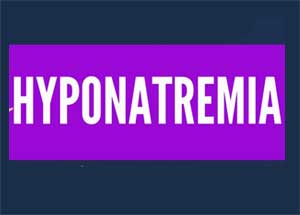- Home
- Editorial
- News
- Practice Guidelines
- Anesthesiology Guidelines
- Cancer Guidelines
- Cardiac Sciences Guidelines
- Critical Care Guidelines
- Dentistry Guidelines
- Dermatology Guidelines
- Diabetes and Endo Guidelines
- Diagnostics Guidelines
- ENT Guidelines
- Featured Practice Guidelines
- Gastroenterology Guidelines
- Geriatrics Guidelines
- Medicine Guidelines
- Nephrology Guidelines
- Neurosciences Guidelines
- Obs and Gynae Guidelines
- Ophthalmology Guidelines
- Orthopaedics Guidelines
- Paediatrics Guidelines
- Psychiatry Guidelines
- Pulmonology Guidelines
- Radiology Guidelines
- Surgery Guidelines
- Urology Guidelines
Even mild Hyponatremia may cause cognitive impairment in elderly

According to new study by Dr.Kristen Nowak, published in Clinical Journal of the American Society of Nephrology (CJASN), Even mild Hyponatremia may cause cognitive impairment and attention disorder in elderly.The hyponatremia is linked with declines in cognitive function with advancing age which can be preserved by improving sodium levels.
Hyponatremia occurs when the sodium level in the blood falls below 135 mmol/L. Mild hyponatremia was once thought to be asymptomatic, but recent studies suggest that it may be associated with higher risks of attention deficits, gait disturbances, falls, cardiovascular events, and even premature death. Severe hyponatremia has been linked with cognitive impairment and neurological disturbances, but the association between different levels of serum sodium and cognition in older adults had been uncertain.
To investigate, Kristen Nowak, PhD, MPH (University of Colorado Anschutz Medical Campus) and her colleagues examined information on 5435 asymptomatic community-dwelling men aged >65 years who were followed for a median of 4.6 years. A total of 100 men had serum levels indicative of hyponatremia.
The researchers found that slightly lower sodium levels in the blood were related to both cognitive impairment and declines in cognitive function over time. Compared with men with sodium levels of 141-142 mmol/L, men with levels of 126-140 mmol/L were 30% more likely to have cognitive impairment at baseline and 37% more likely to experience cognitive decline over time. The investigators also found an association of high serum sodium (143-153 mmol/L) with cognitive decline over time.
"Slightly lower sodium levels in the blood are likely to be unnoticed in clinical practice," said Dr. Nowak. "Because both slightly lower serum sodium levels and mild changes in cognitive function are common occurrences with advancing age, future research on this topic is important -- including determining whether correcting lower sodium levels affects cognitive function."
Clinical Journal of the American Society of NephrologydisorderHyponatremiaKristen Nowakneurological disturbancespremature deathSevere hyponatremiasodium levels
Source : Press ReleaseNext Story
NO DATA FOUND

Disclaimer: This site is primarily intended for healthcare professionals. Any content/information on this website does not replace the advice of medical and/or health professionals and should not be construed as medical/diagnostic advice/endorsement or prescription. Use of this site is subject to our terms of use, privacy policy, advertisement policy. © 2020 Minerva Medical Treatment Pvt Ltd